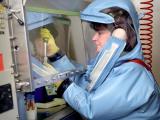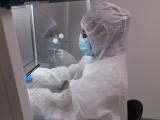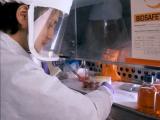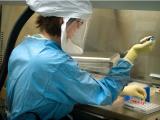Two experts who took part in a "gain-of-function" (GOF) debate in December at the National Academy of Sciences (NAS) in Washington, DC, raised concerns yesterday about the thoroughness and transparency of an ongoing review ordered by the White House of the risks and benefits of the work on H5N1 avian influenza and other virus threats.
In October, the Obama administration announced a pause on federally funded research on influenza, MERS-CoV (Middle East respiratory syndrome coronavirus), and SARS (severe acute respiratory syndrome) viruses to formally assess the risks and benefits and to craft federal policies.
The National Science Advisory Board for Biosecurity (NSABB) is leading the review, which is expected to last a year, and has been asked to recommend an approach for evaluating the studies. The National Institutes of Health (NIH) will commission a formal assessment of the risks and benefits.
The NAS was asked to conduct two public forums, the one in December that included a broad range of stakeholders, and a future one to allow comment on the NSABB's draft policy recommendations on GOF research. "GOF" typically refers to experiments that involve enhancing the pathogenicity, transmissibility, or host range of a pathogen, with the aim of better understanding disease pathways and developing vaccines and drugs.
Shortly after the December NAS symposium the NIH allowed work on five MERS-CoV and flu studies to resume. The NAS recently published a 132-page summary of the symposium.
Concerns over lack of public input
In a letter to Sam Stanley, MD, who heads the NSABB, the experts said they had hoped for a broader representation during the discussions and worried that the meeting was the last opportunity members of the public would have to weigh in on the issues.
The authors are Richard Roberts, PhD, chief scientific officer of New England Biolabs and 1993 Nobel Laureate in Physiology or Medicine, and David Relman, MD, professor of medicine and infectious diseases at Stanford University School of Medicine, former NSABB member, and current member of the NAS Committee on Science, Technology, and Law.
Copies of the letter, which was obtained by CIDRAP News, were also sent to lawmakers representing Roberts' and Relman's Senate and House districts.
Roberts and Relman said that when the Obama administration announced the research pause, they and other groups had pushed for an Asilomar-type conference that would provide a thorough examination of the issues and form the basis of decisions guiding future research, "in which the risks appear enormous and the benefits only slight." The Asilomar meeting was held in 1975 to weigh the potential dangers of recombinant DNA research.
In their letter, they asked the NSABB to consider several questions and issues that were raised at the December NAS meeting. For example, they said proponents of H5N1 GOF research have claimed that the work could guide the development of better vaccines, but Roberts and Relman said it's not clear if vaccine makers agree that the experiments are useful and for their purposes.
The two authors also wrote that although current NSABB members are highly qualified experts in their fields, they appear to have little experience with the formal risk assessment process. "We would strongly recommend that experts in the risk assessment field become an integral part of the process and that clear definitions of risk and benefit be articulated."
Call for global involvement, transparency
Roberts and Relman also urged the NSABB to include the international community in the deliberations, since the rest of the world has a big stake in the issue and may follow the US lead, if the basis is well reasoned.
In addition, they said there appears to be a conflict of interest, because the NSABB is funded and overseen by the NIH, which funds the majority of GOF work so far and has been asked to contract for the risk-benefit assessments. "For this reason, everybody who is involved in the issue should be completely open about the potential conflicts of interest, and the whole process must be as transparent as possible."
Other concerns included an apparent lack of opportunity for public comment before the risk-benefit study is commissioned, which Roberts and Relman said could undercut its credibility. They also said the process laid out to review GOF research seems rushed, based on the timetable aired at the December NAS meeting. "This is not the rigorous, comprehensive, in-depth risk-benefit assessment for which many groups have called," the two experts wrote.
The process lacks a provision to gauge public trust in the event of a catastrophic lab release. "Public trust in science is fragile and needs to be nurtured," they wrote. "Many of us fear the consequences of a catastrophic event that would set back all of science for decades to come."
Roberts and Relman said they both currently view GOF work on the H5N1 virus as a significant risk for little apparent benefit, but they said they're prepared to change their minds if deliberations show that the benefits outweigh the risks.
See also:
Dec 15, 2014, CIDRAP News story "Experts debate research pause, gain-of-function issues"
Dec 18, 2014, CIDRAP News scan "NIH permits MERS-CoV, some flu GOF studies to resume"
National Academies GOF symposium summary

















